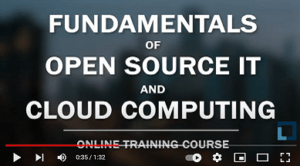The intent of this course is to take you on a journey from little or no knowledge of IT topics to the knowledge needed to demonstrate Linux and cloud environment proficiencies. The course begins with a foundational understanding of computer hardware, software, and operating systems, and walks you through concepts related to system administration, networking, troubleshooting, the Internet, cloud, security, DevOps, project management, and open source software and licensing. The course, along with real-world experience and study, will provide the skills and knowledge also tested by the Linux Foundation Certified IT Associate (LFCA) exam.
Fundamentals of Open Source IT and Cloud Computing (LFS200)



 Chapter 1. Course Introduction
Chapter 1. Course Introduction
 Chapter 2. What is Linux?
Chapter 2. What is Linux?
 Chapter 3. User Interfaces
Chapter 3. User Interfaces
 Chapter 4. Installing Linux
Chapter 4. Installing Linux
 Chapter 5. Linux Filesystems and File Management
Chapter 5. Linux Filesystems and File Management
 Chapter 6. User and System Administration Commands
Chapter 6. User and System Administration Commands
 Chapter 7. Networking and Network Troubleshooting
Chapter 7. Networking and Network Troubleshooting
 Chapter 8. Software and Cloud Computing: Basic Concepts
Chapter 8. Software and Cloud Computing: Basic Concepts
 Chapter 9. Security Fundamentals
Chapter 9. Security Fundamentals
 Chapter 10. DevOps Fundamentals
Chapter 10. DevOps Fundamentals
 Chapter 11. Supporting Applications and Developers
Chapter 11. Supporting Applications and Developers
Bundle this course and the exam to save $50
Before starting this course, we recommend Introduction to Linux, a free edX course.
- The prerequisites are:
A system with one of the following environments installed:- VMware player or Workstation
- Oracle VirtualBox
- KVM
- The necessary skills to create a virtual machine on the chosen hypervisor.
- The machine should have a minimum of 4GB of memory and 20GB of free disk space.
- The install image for Ubuntu 20.04 (link and installation instructions provided in the course).













